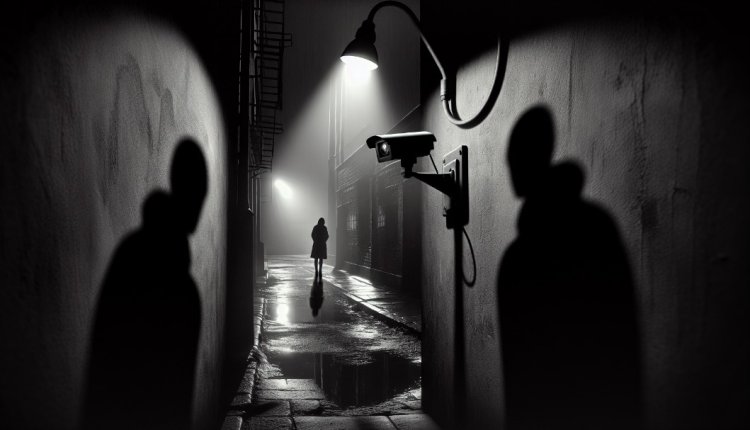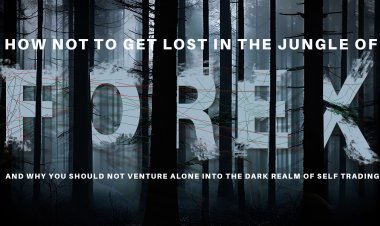Inside the World of Sex Trafficking: Sex Slavery Run by Secret Societies
Venture into the shadowy realms of 'Inside the World of Sex Trafficking: Sex Slavery Run by Secret Societies'. This in-depth exploration uncovers the alarming reality of sex trafficking networks, revealing how secret societies orchestrate these heinous crimes against the vulnerable.

Introduction
The global sex trade is a dark and disturbing industry that thrives on the exploitation of vulnerable individuals. It is a multibillion-dollar business that transports hundreds of thousands of women each year. In this hidden camera investigation, Frontline takes a closer look at the new global sex trade, shedding light on the lives of the victims and the criminals involved.
The investigation begins in Odesa, Ukraine, a port town known for its beautiful women and notorious organized crime. The production team sets up cameras to capture the reality of the sex trafficking industry in this location. They aim to answer fundamental questions about why these women don't escape and how they are enslaved.
The importance of raising awareness about sex trafficking cannot be understated. By shedding light on this hidden world, we can work towards putting an end to it. It is crucial to educate the public about the signs of trafficking and how to report it. Additionally, it is important to support organizations that provide resources and support for survivors of trafficking.
One of the most concerning aspects of sex trafficking is the lack of action from governments around the world. Many governments seem indifferent to the abuses committed by traffickers. There are questions about why laws are not being enforced effectively and why traffickers are not being held accountable for their crimes.
In the next sections, we will delve deeper into the hidden camera investigation and explore the stories of those affected by sex trafficking. By understanding the realities of this industry, we can work towards creating a world where no one is forced into such a life.
Behind the scenes in Odessa, Ukraine
Odessa, Ukraine, is a major hub for sex trafficking, known for its beautiful women and organized crime. The production team chose this location for their hidden camera investigation because of its prevalence in the sex trafficking industry. They aim to answer important questions about why these women don't escape and how they become enslaved.
Women are lured to Odessa from struggling countries in Eastern Europe with promises of work abroad. Many of these women are unaware of the true intentions of the traffickers. They are often tricked into thinking they will be working as domestics or in other legitimate jobs, only to be sold to traffickers and pimps in Turkey. The lack of education and desperation of these women make them easy targets for traffickers.
Odessa's location and its lax visa requirements make it an ideal location for investigation. The traffickers have an easy time transporting these women across borders, as the women themselves often help the traffickers by lying to customs officials. The investigation aims to understand how these women can be kidnapped, enslaved, and transported without detection.
The Ukrainian Secret Service plays a crucial role in the investigation. They have provided the production team with a tip about a suspected sex trader in Odessa. This individual regularly brings girls through Odessa to be trafficked in Turkey. By working with the Ukrainian Secret Service, the team hopes to gather more information about the sex trafficking network and possibly rescue victims.
By shedding light on the dark realities of sex trafficking in Odessa, this investigation aims to raise awareness about this issue and work towards putting an end to it. It is important to support organizations that provide resources and support for survivors of trafficking and to educate the public about the signs of trafficking and how to report it.
The journey to Turkey
Turkey holds a significant position in the global sex trafficking market. The country's lax visa requirements and its role as a major hub for traffickers make it an attractive destination for trafficked women. Traffickers exploit these conditions to easily transport women across borders.
Women are often lured to Turkey from struggling countries in Eastern Europe with promises of work abroad. They are tricked into thinking they will have legitimate jobs, such as working as domestics, only to be sold to traffickers and pimps in Turkey. The lack of education and desperation of these women make them easy targets for traffickers.
Customs officials play a role in the ease of trafficking women across borders. The women themselves often assist traffickers by lying to officials about their intentions in the country, allowing them to pass through customs undetected. This complicity further enables traffickers to continue their operations.
The investigation in Odessa, Ukraine, revealed the complicity of customs officials and the role they play in the trafficking of women. The production team set up cameras to capture the reality of the sex trafficking industry in this location. They witnessed how traffickers easily transported women across borders with the help of these officials.
It is crucial to address the complicity of customs officials and hold them accountable for their role in enabling sex trafficking. Efforts should be made to strengthen border control measures and ensure that officials are trained to identify and prevent human trafficking.
By shedding light on the journey to Turkey and the ease of trafficking women across borders, this investigation aims to raise awareness about the issue and work towards putting an end to it. It is important to support organizations that provide resources and support for survivors of trafficking and to educate the public about the signs of trafficking and how to report it.
Life in Captivity
When it comes to the conditions faced by trafficked women, the reality is incredibly bleak. These women are torn from their lives, taken from their families, and sold into slavery. They become victims of a multibillion-dollar international business that profits off their suffering.
Survivors of sex trafficking have shared their experiences, shedding light on the horrifying conditions they faced. Many speak of being locked in apartments or houses, where they are forced to service clients 24 hours a day. They are subjected to physical and psychological abuse, including beatings, rape, and threats to their lives and the lives of their loved ones.
The cycle of debt bondage and forced prostitution is a common theme among survivors. Traffickers often tell these women that they need to work off a debt that they will never truly be able to pay off. This debt is constantly inflated, and the women are forced to work without receiving any of the money they earn.
The psychological toll of life in captivity is immense. Many survivors suffer from severe trauma, including post-traumatic stress disorder (PTSD), depression, and anxiety. They often struggle to trust others and to reintegrate into society after their ordeal.
It is important to listen to the stories of survivors and to understand the psychological and physical abuse they endure. By raising awareness about the conditions faced by trafficked women, we can work towards creating a world where no one is forced into such a life.
The Fight for Freedom
One man, known as VRL, is on a determined mission to rescue his wife from the clutches of sex trafficking. He is willing to do whatever it takes to bring her back home safely. His story is one of bravery and resilience in the face of unimaginable adversity.
Vrl has made numerous attempts to negotiate with the traffickers, hoping to secure his wife's release. He has pleaded, bargained, and even offered large sums of money in exchange for her freedom. However, his efforts have been met with resistance and manipulation from the traffickers.
The risks and dangers faced by VRL in his pursuit of his wife are immense. He is constantly at risk of physical harm and retaliation from the traffickers. The traffickers do not hesitate to use violence and intimidation to maintain control over their victims. Despite these risks, VRL remains unwavering in his determination to save his wife.
Unfortunately, VRL has received little to no support from the Turkish police in his fight for freedom. Despite his pleas for assistance, they have shown little interest in pursuing the traffickers or helping him locate his wife. This lack of support only adds to the challenges VRL faces in its mission.
Vrl's fight for freedom serves as a stark example of the obstacles faced by those trying to rescue their loved ones from the horrors of sex trafficking. It highlights the urgent need for increased awareness, support, and action to combat this global issue.
Survivors and the Long Road to Recovery
Survivors of sex trafficking face immense struggles and trauma as they try to rebuild their lives. Interviews with survivors reveal the horrifying conditions they endured, including physical and psychological abuse, rape, and threats to their lives and the lives of their loved ones. These survivors often suffer from severe trauma such as post-traumatic stress disorder (PTSD), depression, and anxiety.
Returning home after being trafficked presents its own set of difficulties. Many survivors struggle to reintegrate into society and to trust others. They often face judgment and stigma from their communities, further isolating them from the support they need.
One of the biggest challenges faced by survivors is the lack of support and resources available to them. Governments and organizations often fail to provide adequate assistance, leaving survivors to navigate their recovery alone. There is a lack of safe housing, counseling services, and job opportunities specifically tailored to the unique needs of survivors.
The physical toll of trafficking is also significant. Many survivors suffer from long-term health issues resulting from their captivity, including sexually transmitted diseases, HIV/AIDS, and other chronic illnesses. The lack of access to healthcare further exacerbates their physical and emotional pain.
We must listen to the stories of survivors and understand the immense challenges they face. By raising awareness about the physical and emotional toll of trafficking, we can work towards providing better support and resources for survivors. This includes advocating for stronger laws and enforcement, funding for survivor services, and education to prevent trafficking in the first place.
The Legal Battle and Its Limitations
The fight against sex trafficking involves legal action against the traffickers, but prosecuting them is not without its challenges and limitations.
Discussion of the legal action taken against the traffickers
Efforts are made to arrest and prosecute those involved in sex trafficking, such as in the case of Vlad, a trafficker who was arrested in Odessa, Ukraine. Vlad was charged with finding women in Moldova and bringing them to Istanbul, Turkey, for sexual exploitation. However, the prosecution rate for traffickers is often low, and many traffickers can evade justice.
The challenges and limitations of prosecuting traffickers
One of the main challenges in prosecuting traffickers is gathering sufficient evidence to prove their guilt. Trafficking often takes place in hidden locations and involves complex networks, making it difficult to collect concrete evidence against the perpetrators. Additionally, many victims are reluctant or afraid to testify against their traffickers, further complicating the legal process.
The role of corruption in preventing justice
Corruption within law enforcement agencies and the judicial system can also hinder the prosecution of traffickers. Some officials may turn a blind eye to trafficking activities or even collude with traffickers, allowing them to continue their operations without consequence. This corruption undermines efforts to combat sex trafficking and protect the rights of victims.
The need for stronger legislation and enforcement
To effectively combat sex trafficking, stronger legislation and enforcement are needed. Laws should be updated and strengthened to specifically address the nuances of sex trafficking to hold traffickers accountable for their crimes. Additionally, law enforcement agencies should receive comprehensive training on identifying and investigating trafficking cases, and efforts should be made to combat corruption within these agencies.
Overall, while legal action is an essential component of the fight against sex trafficking, some limitations and challenges need to be addressed to ensure that justice is served and victims are protected.
Conclusion: The Urgency to Address the Issue
The hidden camera investigation into the world of sex trafficking has shed light on the dark and disturbing industry that exploits vulnerable individuals. The findings of this investigation are alarming and demand immediate action from governments and individuals alike.
The investigation in Odessa, Ukraine, revealed the prevalence of sex trafficking in this location and the ease with which traffickers transport women across borders. The lack of action from governments around the world is concerning and raises questions about the enforcement of laws and the accountability of traffickers.
Governments must take immediate action to address this issue. Laws should be updated and strengthened to specifically address the complexities of sex trafficking. Law enforcement agencies should receive comprehensive training on identifying and investigating trafficking cases, and efforts should be made to combat corruption within these agencies.
Individuals also have a role to play in combating sex trafficking. Raising awareness about the signs of trafficking and how to report it is essential. Supporting organizations that provide resources and support for survivors of trafficking is also important.
The stories of survivors highlight the importance of raising awareness and providing support to these individuals. Survivors of sex trafficking face immense struggles and trauma as they try to rebuild their lives. We must listen to their stories, provide them with the support they need, and work towards creating a world where no one is forced into such a life.
In conclusion, the urgency to address the issue of sex trafficking cannot be overstated. Governments must take immediate action, individuals must raise awareness and support survivors, and together, we can work towards a better future where no one is exploited and trafficked.



 admin
admin 










